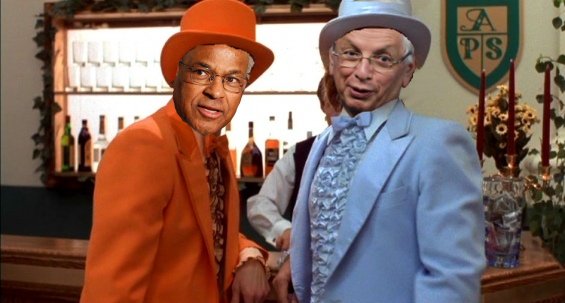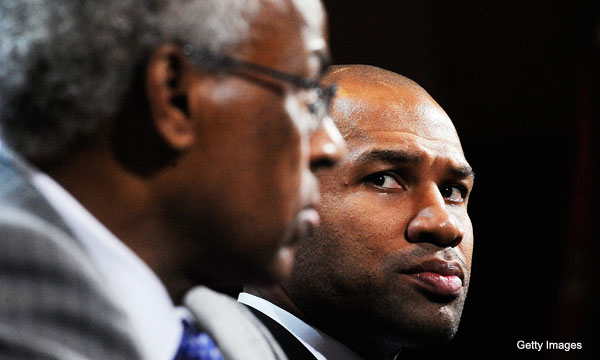 First, a definition of terms.
First, a definition of terms.
1) Abyss: Whereby the 2011-12 NBA season is lost and the union decertifies and/or fires union heads Billy Hunter and Derrick Fisher.
2) Negotiating/Collective bargaining: The process in which workers, constitutionally certified as a bargaining unit and their employers hammer out a contract that stipulates wages, benefits, workplace conditions, disciplinary process, sick day and attendance policies, grievance procedure, hiring/firing rules, drug testing/substance abuse policy, seniority and severance pay rules, and other agreed upon workplace issues.
3) Unbargained or unbargaining: The process in which workers and their employers meet, talk and talk, and fail to hammer out a contract on most of the workplace items noted above.
Now digest the following note from The New York Times report on the current status of NBA player-owner negotiations:
It is unclear whether the union could call for a full membership vote, since the deal is technically not complete; there are 30 to 40 “B-list” items – such as drug testing, player discipline and days off — that have yet to be negotiated.
That’s a troubling note, raising serious questions about what the NBA and the players union have been talking about ad nauseum for the last two months – and 23 hours this week when Commissioner David Stern let on to the media that there was a laundry list of issues to discuss other than the previously identified “A-list” issues.
Sure, there’s been a lot of posturing about those “A-list items — the all-important split of basketball related income (BRI) as well as some “system” and “competitive balance” issues that are not as important, systemic or balancing as Fisher and Hunter and the league made them out to be.*
 While all parties involved were busy posturing, it apparently didn’t occur to anyone to bargain on anything else.
While all parties involved were busy posturing, it apparently didn’t occur to anyone to bargain on anything else.
Whether a vote of the full membership now is possible, however, is much clearer than The NY Times suggests. Yes, union membership can vote on an incomplete agreement, and there is often little legal recourse if items change in the final contract, according to the site UnionDemocracy.org.
It’s a trust thing. Membership trusts its elected leaders and bargaining team leaders to do the right thing and communicate the important changes to the contract. Other member ratification rights and voting rules are outlined in each union’s constitution, on file with the federal government. If union leadership betrays that trust, the law says it’s not the employers problem and the contract typically stands until the next bargaining opportunity.
The problem here is that the NBA membership is not likely to appreciate voting on an incomplete agreement, especially not after Fisher and his bargaining team backed all the way down to a 50-50 split on BRI — and failed to win big concessions to trumpet to the 450-member players association. You don’t need a Harvard Law degree to understand that more unbargained contract items mean less chance of approval, or that no meaningful concessions are a hard sell.
This was a grave miscalculation by Hunter and Fisher, who are being picked on here — instead of the owners — because Hunter and Fisher accomplished so little during negotiations.
Here we have one monumental change — players will get 50% of BRI instead of the current 57%. Unfortunately for Fisher and Hunter, the owners refused to back down on the one free agency issue that would have benefited improving small and medium market teams — the ability to nudge into luxury tax land while using the full $5 million MLE. According to CBS Sports, the amount available to sign a free agent would be the reduced $3 million MLE, certainly not the end of the world for smaller market teams but a nice equalizer for big spenders like the Lakers.
(See Hoopshype 2011-12 team salaries page).
This could be an immediate problem for the Miami Heat (payroll $5 million under the luxury limit), the Hawks and Trailblazers; and a problem for many teams, Milwaukee Bucks included, when the 50% cap goes into effect.
Right now, it’s a problem for Hunter and Fisher and everyone who cares whether there is an NBA season this year. The union leadership allowed the owners to back them to the edge of the abyss, failed to get solid concessions and then allowed a woefully incomplete contract proposal to be presented to their members via player agents and the media.
“Trust us. This was the best we could do,” they might be saying to members and their player reps.
“How quickly does Billy (Hunter) get fired after we sign this bullshit,” one veteran player texted to Yahoo NBA columnist Adrian Wojnarowski.
NBA player reps will decide on Monday-Tuesday whether to go to a full membership vote on Hunter and Fisher’s largely unbargained contract mess.
Bullshit better fly.
*******************
 *Note: The actual impact of the much-discussed “A-List’ system issues is debatable with the one notable exception discussed above on the MLE vs. luxury tax calculation, which does impact competitive balance and the free agent market. Hunter and Fisher couldn’t win this concession. Under the owners’ proposal small market teams would not be able to improvea without being treated like repeat tax offenders (Lakers, Celtics currently). This is being referred to as a “tax cliff.”
*Note: The actual impact of the much-discussed “A-List’ system issues is debatable with the one notable exception discussed above on the MLE vs. luxury tax calculation, which does impact competitive balance and the free agent market. Hunter and Fisher couldn’t win this concession. Under the owners’ proposal small market teams would not be able to improvea without being treated like repeat tax offenders (Lakers, Celtics currently). This is being referred to as a “tax cliff.”
The other “A-List” items are all fairly minor, considering that repeat tax offenders have been rare in the history of the current cap rules (since 2005). (See Hoopshype salaries page). Luxury tax revenue sharing doesn’t impact competitive balance on the court. Sign and trade deals are rare. Big spenders will still have an MLE. Etc. etc. etc.
Other than the 50-50 split on BRI, there’s not much new here for either the Miami’s or Milwaukee’s of the NBA. No, the new proposal is not worse than the last one, as some agents are suggesting. But hey — if they don’t like it, either party can opt out after six years. Not much of a selling point but the best card Fisher and Hunter managed to negotiate for their members.
To be continued …

 The cancellation of the November schedule has cost the Bucks
The cancellation of the November schedule has cost the Bucks  Yes, and the Pacers are part of the point — one of the games lost is a home game against the Pacers, a plum opportunity to begin righting last season’s failures. Not-yet-cancelled are two games in Indy and a game in Milwaukee. Ratchet up the degree of difficulty a bit more with Pacers home court advantage against the Bucks, something the Bulls will also enjoy if the games cancelled remain off the calendar.
Yes, and the Pacers are part of the point — one of the games lost is a home game against the Pacers, a plum opportunity to begin righting last season’s failures. Not-yet-cancelled are two games in Indy and a game in Milwaukee. Ratchet up the degree of difficulty a bit more with Pacers home court advantage against the Bucks, something the Bulls will also enjoy if the games cancelled remain off the calendar. Kohl and the Bucks front office have got to be eyeing that Celtics game and rueing the day more games are tossed into the shredder. A Celtics game is one of those money-making, potential sell-outs, an easy-marketing homecoming for Ray, one of the last chances to see the current Celtics before they rebuild (Ray and Kevin Garnett will be free agents after this season). It’s a natural for the Bucks’ 2012 home-opener, ready or not.
Kohl and the Bucks front office have got to be eyeing that Celtics game and rueing the day more games are tossed into the shredder. A Celtics game is one of those money-making, potential sell-outs, an easy-marketing homecoming for Ray, one of the last chances to see the current Celtics before they rebuild (Ray and Kevin Garnett will be free agents after this season). It’s a natural for the Bucks’ 2012 home-opener, ready or not. But like Portland Trailblazers owner Paul Allen,
But like Portland Trailblazers owner Paul Allen,  With the first ever Packers-Bears NFC Championship on tap Sunday, few heads in cheesehead-land are wrapped around the goings-on of the Milwaukee Bucks. This is not necessarily a bad thing considering
With the first ever Packers-Bears NFC Championship on tap Sunday, few heads in cheesehead-land are wrapped around the goings-on of the Milwaukee Bucks. This is not necessarily a bad thing considering  Corey Maggette’s name has surfaced on the Dallas Mavericks “radar”
Corey Maggette’s name has surfaced on the Dallas Mavericks “radar” If Jackson’s not the guy, the Mavs don’t have to look far to find a player who fits their needs to a Texas T. He’s right next to Maggette in the Bucks current starting lineup, and is less expensive than any of the forwards ESPN has mentioned on the Mavs radar:
If Jackson’s not the guy, the Mavs don’t have to look far to find a player who fits their needs to a Texas T. He’s right next to Maggette in the Bucks current starting lineup, and is less expensive than any of the forwards ESPN has mentioned on the Mavs radar:  Salmons has the edge in cost, at least over the next three years — $8 million this year, $8.5 million next year, 5 yrs –
Salmons has the edge in cost, at least over the next three years — $8 million this year, $8.5 million next year, 5 yrs – 